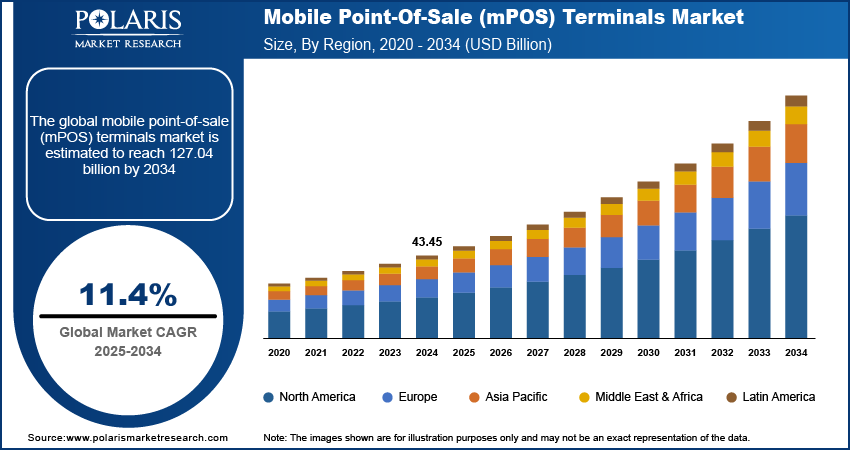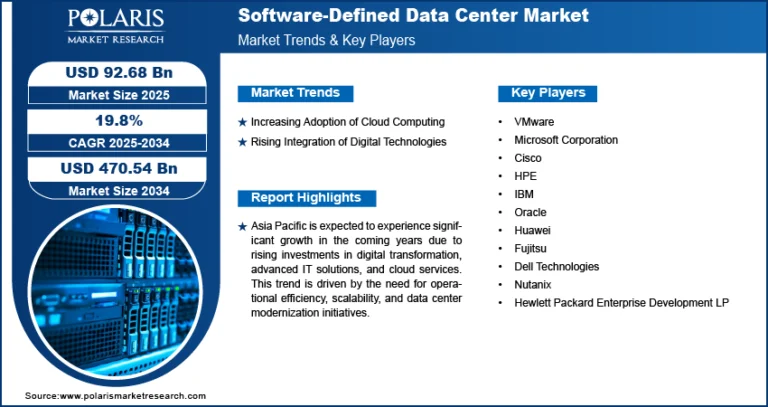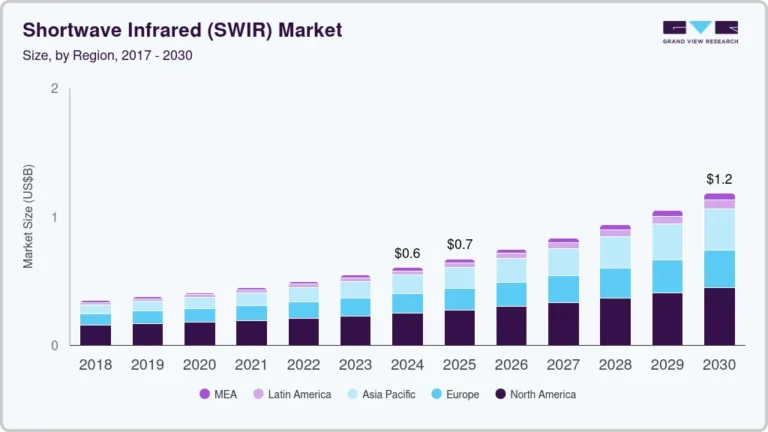Mobile Point-Of-Sale (Mpos) Terminals Market Expected to Reach USD 127.04 Billion by 2034 | CAGR: 11.4%

According to the latest study by Polaris Market Research, the global mobile point-of-sale (mPOS) terminals market is valued at USD 43.45 billion in 2024 and is projected to reach USD 127.04 billion by 2034. The market is expected to grow at a strong CAGR of 11.4% during the forecast period from 2025 to 2034.
Key Trends
• Rise in contactless and biometric payments, especially after the COVID-19 pandemic.
• Integration of AI and data analytics in POS systems to enable personalized customer experiences and inventory management.
• Emergence of IoT-enabled POS terminals for real-time data and operational efficiency.
• Widespread adoption of cloud-based and SaaS POS models for scalability and remote accessibility.
Market Size & Forecast
|
Market Size Value in 2024 |
USD 43.45 billion |
|
Market Size Value in 2025 |
USD 48.26 billion |
|
Revenue Forecast by 2034 |
USD 127.04 billion |
|
CAGR |
11.4% from 2025 to 2034 |
|
Base Year |
2024 |
|
Historical Data |
2020–2023 |
|
Forecast Period |
2025–2034 |
What is the Mobile Point-Of-Sale (Mpos) Terminals Market ?
Mobile Point-Of-Sale (mPOS) Terminals are portable, wireless devices or systems that allow businesses to accept payments anywhere, without being tied to a traditional checkout counter. These systems typically consist of a smartphone or tablet connected to a card reader or payment app via Bluetooth, Wi-Fi, or mobile data.
Key Features:
- Accepts credit/debit cards, contactless payments (NFC), and mobile wallets (e.g., Apple Pay, Google Pay)
- Lightweight and easy to carry, ideal for retail, food trucks, events, delivery services
- Often cloud-based, enabling real-time sales tracking and integration with inventory, CRM, or analytics platforms
- More affordable and flexible than traditional POS systems
mPOS solutions are increasingly popular among small businesses and mobile professionals due to their convenience, scalability, and cost-effectiveness.
Growth Drivers
• Increasing adoption of digital and cashless payments through NFC, QR codes, and mobile wallets.
• Small and medium-sized enterprises prefer mobile, cost-effective, and easy-to-integrate POS solutions.
• Growth of e-commerce and omnichannel retail is driving demand for integrated and flexible POS systems.
𝐆𝐞𝐭 𝐄𝐱𝐜𝐥𝐮𝐬𝐢𝐯𝐞 𝐒𝐚𝐦𝐩𝐥𝐞 𝐏𝐚𝐠𝐞𝐬 𝐨𝐟 𝐓𝐡𝐢𝐬 𝐑𝐞𝐩𝐨𝐫𝐭:
Rapid Adoption of Cloud-Based POS Systems in E-Commerce, Retail, and Warehouse Management:
The growing shift toward digital transformation is accelerating the adoption of cloud-based POS systems across the e-commerce and retail sectors. These solutions offer enhanced flexibility, real-time inventory tracking, seamless integration with online platforms, and improved customer data management. Businesses are increasingly leveraging cloud-based POS to streamline operations, improve sales efficiency, and offer a unified omnichannel experience.
In addition, warehouse management systems (WMS) are being integrated with cloud-based POS platforms to optimize inventory control, automate stock replenishment, and improve order accuracy. This integration ensures real-time visibility across the supply chain, reduces operational costs, and enhances overall productivity. As demand for scalable, data-driven systems rises, the combined use of POS and WMS is becoming a key enabler for efficient retail and warehouse operations.
Opportunities
• Expansion potential in emerging markets across Asia Pacific, Africa, and Latin America due to rising smartphone usage and financial inclusion efforts.
• Growing demand for value-added services such as CRM, loyalty programs, and digital invoicing within POS systems.
• Integration of mPOS systems with digital wallets and cryptocurrency payments presents new avenues for growth.
• Continuous technological advancements, including AI, IoT, and blockchain, offer avenues for innovation and market differentiation.






